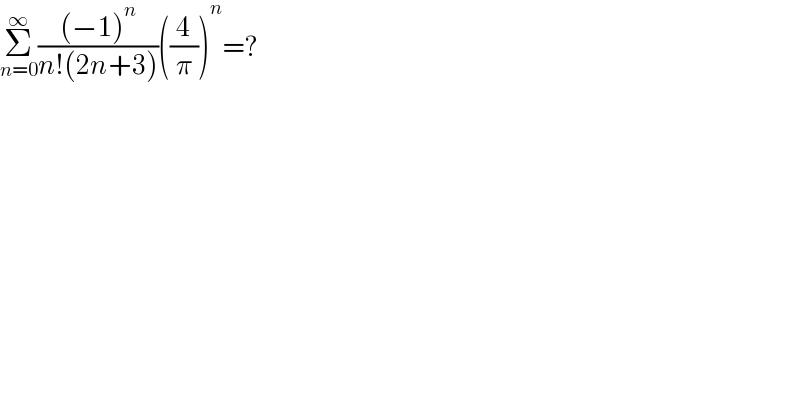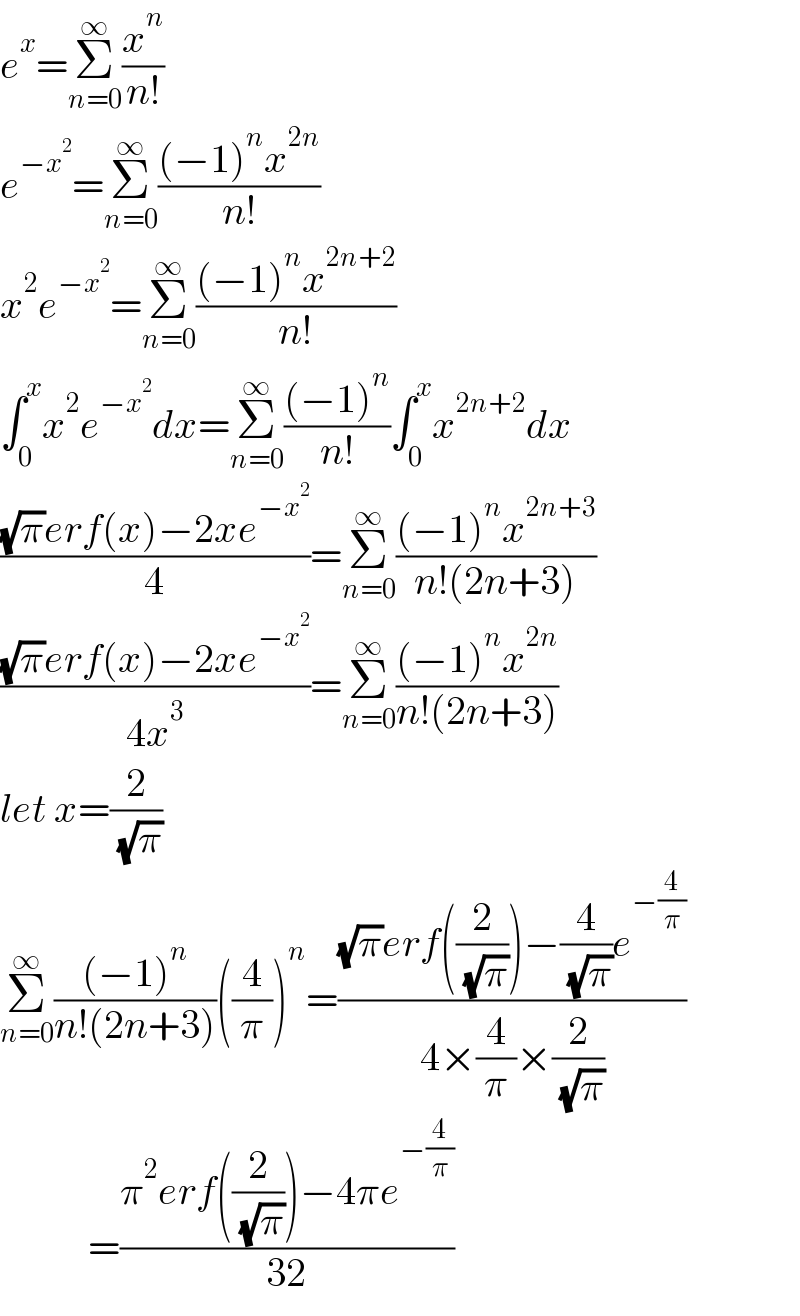Question Number 138598 by qaz last updated on 15/Apr/21

$$\underset{{n}=\mathrm{0}} {\overset{\infty} {\sum}}\frac{\left(−\mathrm{1}\right)^{{n}} }{{n}!\left(\mathrm{2}{n}+\mathrm{3}\right)}\left(\frac{\mathrm{4}}{\pi}\right)^{{n}} =? \\ $$
Answered by mr W last updated on 15/Apr/21

$${e}^{{x}} =\underset{{n}=\mathrm{0}} {\overset{\infty} {\sum}}\frac{{x}^{{n}} }{{n}!} \\ $$$${e}^{−{x}^{\mathrm{2}} } =\underset{{n}=\mathrm{0}} {\overset{\infty} {\sum}}\frac{\left(−\mathrm{1}\right)^{{n}} {x}^{\mathrm{2}{n}} }{{n}!} \\ $$$${x}^{\mathrm{2}} {e}^{−{x}^{\mathrm{2}} } =\underset{{n}=\mathrm{0}} {\overset{\infty} {\sum}}\frac{\left(−\mathrm{1}\right)^{{n}} {x}^{\mathrm{2}{n}+\mathrm{2}} }{{n}!} \\ $$$$\int_{\mathrm{0}} ^{{x}} {x}^{\mathrm{2}} {e}^{−{x}^{\mathrm{2}} } {dx}=\underset{{n}=\mathrm{0}} {\overset{\infty} {\sum}}\frac{\left(−\mathrm{1}\right)^{{n}} }{{n}!}\int_{\mathrm{0}} ^{{x}} {x}^{\mathrm{2}{n}+\mathrm{2}} {dx} \\ $$$$\frac{\sqrt{\pi}{erf}\left({x}\right)−\mathrm{2}{xe}^{−{x}^{\mathrm{2}} } }{\mathrm{4}}=\underset{{n}=\mathrm{0}} {\overset{\infty} {\sum}}\frac{\left(−\mathrm{1}\right)^{{n}} {x}^{\mathrm{2}{n}+\mathrm{3}} }{{n}!\left(\mathrm{2}{n}+\mathrm{3}\right)} \\ $$$$\frac{\sqrt{\pi}{erf}\left({x}\right)−\mathrm{2}{xe}^{−{x}^{\mathrm{2}} } }{\mathrm{4}{x}^{\mathrm{3}} }=\underset{{n}=\mathrm{0}} {\overset{\infty} {\sum}}\frac{\left(−\mathrm{1}\right)^{{n}} {x}^{\mathrm{2}{n}} }{{n}!\left(\mathrm{2}{n}+\mathrm{3}\right)} \\ $$$${let}\:{x}=\frac{\mathrm{2}}{\:\sqrt{\pi}} \\ $$$$\underset{{n}=\mathrm{0}} {\overset{\infty} {\sum}}\frac{\left(−\mathrm{1}\right)^{{n}} }{{n}!\left(\mathrm{2}{n}+\mathrm{3}\right)}\left(\frac{\mathrm{4}}{\pi}\right)^{{n}} =\frac{\sqrt{\pi}{erf}\left(\frac{\mathrm{2}}{\:\sqrt{\pi}}\right)−\frac{\mathrm{4}}{\:\sqrt{\pi}}{e}^{−\frac{\mathrm{4}}{\pi}} }{\mathrm{4}×\frac{\mathrm{4}}{\pi}×\frac{\mathrm{2}}{\:\sqrt{\pi}}} \\ $$$$\:\:\:\:\:\:\:\:\:\:\:=\frac{\pi^{\mathrm{2}} {erf}\left(\frac{\mathrm{2}}{\:\sqrt{\pi}}\right)−\mathrm{4}\pi{e}^{−\frac{\mathrm{4}}{\pi}} }{\mathrm{32}} \\ $$
